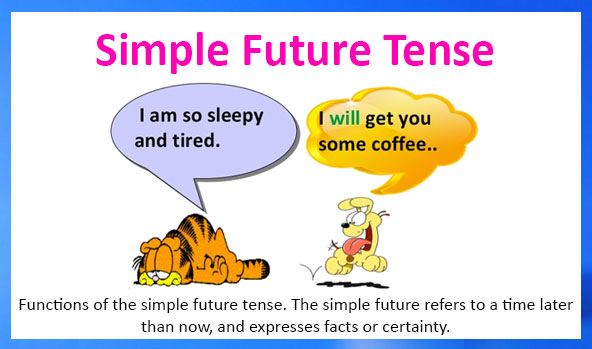முழுமையான தமிழ் விளக்கத்துடன் ஆங்கில இலக்கண பாடப் பயிற்சி.
இது பாடசாலை பாடத்திட்டத்தைப் போன்றோ, ஆங்கில பேச்சுப் பயிற்சி (Spoken English) போன்றோ அல்லாமல், முழுமையான தமிழ் விளக்கத்துடன் ஆங்கில இலக்கண பாடத் திட்டத்தைக்கொண்டது. இதில் சகல “Grammar Patterns” களும் உள்ளடக்கப்பட்டுள்ளன.இப்பாடத்திட்டத்தில் இலக்கணப் பிழையின்றி ஆங்கிலம் பேசவும், எழுதவும், வாசிக்கவும் கற்றுக்கொள்ளலாம்.
தமிழ் மொழிப்பெயர்ப்பு பற்றிய விளக்கம்
உதாரணமாக “I do a job” எனும் வாக்கியத்தை தமிழில் மொழி பெயர்ப்போமானால், “நான் ஒரு வேலை செய்கின்றேன்.” என்று தான் கூறுவோம். ஆனால் நாம் இந்த ஆங்கில பாடப் பயிற்சியில் “நான் செய்கின்றேன் ஒரு வேலை.” என்றே தமிழாக்கம் செய்துள்ளோம். இதற்கான காரணம் இவ்வாறுதான் ஆங்கிலத்தை தமிழில் மொழிப்பெயர்க்க வேண்டும் என்று நாம் கூறவில்லை. ஆனால் முடிந்தவரையில் ஆங்கில நடைக்கு ஏற்றாற் போல் தமிழ் விளக்கம் கொடுத்து பயிற்சி செய்தால்; ஆங்கில வார்த்தைகளுக்கு மட்டுமல்லாமல், ஒவ்வொரு ஆங்கில சொற்களுக்குமான தமிழ் அர்த்தத்தையும் விளங்கிக் கற்க இலகுவாய் இருக்கும் என்பது எமது கருத்தாகும்.
இங்கே “
do a job” எனும் ஒரு வார்த்தையை இன்றையப் பாடமாக எடுத்துக்கொள்வோம். இவ்வார்த்தையின் தமிழ் அர்த்தம் “செய் ஒரு வேலை” என்பதாகும். இதை “நான் செய்கின்றேன் ஒரு வேலை, நான் செய்தேன் ஒரு வேலை, நான் செய்வேன் ஒரு வேலை” என ஒரே வார்த்தையை 73 விதமாக மாற்றி பயிற்சி செய்வதே இப்பாடத்திட்டத்தின் நோக்கமாகும். இது மிகவும் இலகுவாகவும் அதிவிரைவாகவும் ஆங்கிலம் கற்றுக்கொள்ளக் கூடிய ஓர் பயிற்சி முறையாகும்.
do a job
1.
I do a Job.
நான் செய்கின்றேன் ஒரு வேலை.
2.
I am doing a job.
நான் செய்துக்கொண்டிருக்கின்றேன் ஒரு வேலை.
3.
I did a job.
நான் செய்தேன் ஒரு வேலை.
4.
I didn’t do a job.
நான் செய்யவில்லை ஒரு வேலை.
5.
I will do a job.
நான் செய்வேன் ஒரு வேலை.
நான் செய்கிறேன் (சற்றுப் பிறகு) ஒரு வேலை.
6.
I won’t do a job.
நான் செய்யமாட்டேன் ஒரு வேலை.
7. Usually
I don’t do a job.
சாதாரணமாக நான் செய்கிறேனில்லை ஒரு வேலை.
8.
I am not doing a job.
நான் செய்துக் கொண்டிருக்கின்றேனில்லை ஒரு வேலை.
9.
I was doing a job.
நான் செய்துக் கொண்டிருந்தேன் ஒரு வேலை.
10.
I wasn’t doing a job.
நான் செய்துக் கொண்டிருக்கவில்லை ஒரு வேலை.
11.
I will be doing a job.
நான் செய்துக் கொண்டிருப்பேன் ஒரு வேலை.
12.
I won’t be doing a job.
நான் செய்துக் கொண்டிருக்கமாட்டேன் ஒரு வேலை.
13.
I am going to do a job.
நான் செய்யப் போகின்றேன் ஒரு வேலை.
14.
I was going to do a job.
நான் செய்யப் போனேன் ஒரு வேலை.
15.
I can do a job.
16.
I am able to do a job.
எனக்கு செய்ய முடியும் ஒரு வேலை
17.
I can’t do a job.
18.
I am unable to do a job.
எனக்கு செய்ய முடியாது ஒரு வேலை.
19.
I could do a job.
20.
I was able to do a job.
எனக்கு செய்ய முடிந்தது ஒரு வேலை.
21.
I couldn’t do a job.
22.
I was unable to do a job.
எனக்கு செய்ய முடியவில்லை ஒரு வேலை.
23.
I will be able to do a job.
எனக்கு செய்ய முடியுமாக இருக்கும் ஒரு வேலை.
24.
I will be unable to do a job.
எனக்கு செய்ய முடியாமலிருக்கும் ஒரு வேலை.
25.
I may be able to do a job.
எனக்கு செய்ய
முடியுமாக இருக்கலாம் ஒரு வேலை.
26.
I should be able to do a job.
எனக்கு செய்ய
முடியுமாகவே இருக்கும் ஒரு வேலை
27.
I have been able to do a job.
(Perfect Tense பார்க்கவும்)
சற்றுமுன்பிருந்து/கிட்டடியிலிருந்து எனக்கு செய்யமுடியுமாக இருக்கின்றது ஒரு வேலை.
28.
I had been able to do a job.
அக்காலத்திலிருந்து/அன்றிலிருந்து எனக்கு செய்யமுடியுமாக இருந்தது ஒரு வேலை.
29.
I may do a job.
30.
I might do a job.
31.
I may be doing a job.
நான் செய்யலாம் ஒரு வேலை.
32.
I must do a job.
நான் (கட்டாயம்) செய்ய வேண்டும் ஒரு வேலை.(அழுத்தம்)
33.
I must not do a job.
நான் செய்ய வேண்டியதில்லை ஒரு வேலை.
நான் செய்யக் கூடாது ஒரு வேலை.
34.
I should do a job.
நான் செய்யவே வேண்டும் ஒரு வேலை. (மிக அழுத்தம்)
35.
I shouldn’t do a job.
நான் செய்யவே வேண்டியதில்லை ஒரு வேலை.
நான் செய்யவே கூடாது ஒரு வேலை.
36.
I ought to do a job.
நான் எப்படியும் செய்யவே வேண்டும் ஒரு வேலை. (மிக மிக அழுத்தம்)
37.
I don’t mind doing a job.
எனக்கு ஆட்சேபனையில்லை செய்ய ஒரு வேலை.
38.
I have to do a job.
நான்/எனக்கு செய்ய வேண்டும் ஒரு வேலை.
39.
I don’t have to do a job.
நான்/எனக்கு செய்ய வேண்டியதில்லை ஒரு வேலை.
40.
I had to do a job.
நான்/எனக்கு செய்ய வேண்டி ஏற்பட்டது ஒரு வேலை.
41.
I didn’t have to do a job.
நான்/எனக்கு செய்ய வேண்டி ஏற்படவில்லை ஒரு வேலை.
42.
I will have to do a job.
எனக்கு செய்ய வேண்டி ஏற்படும் ஒரு வேலை.
43.
I won’t have to do a job.
எனக்கு செய்ய வேண்டி ஏற்படாது ஒரு வேலை.
44.
I need to do a job.
எனக்கு அவசியம் செய்ய (வேண்டும்) ஒரு வேலை.
45.
I needn’t to do a job.
45.
I don’t need to do a job.
எனக்கு அவசியமில்லை செய்ய ஒரு வேலை.
46.
He seems to be doing a job.
அவன் செய்கின்றான் போல் தெரிகின்றது ஒரு வேலை.
47.
He doesn’t seem to be doing a job.
அவன் செய்கின்றான் போல் தெரிகின்றதில்லை ஒரு வேலை.
48.
He seemed to be doing a job.
அவன் செய்கிறான் போல் தெரிந்தது ஒரு வேலை.
49.
He didn’t seem to be doing a job.
அவன் செய்கிறான் போல் தெரியவில்லை ஒரு வேலை
50. Doing a job
is useful.
செய்வது(தல்) ஒரு வேலை பிரயோசனமானது.
51.
Useless doing a job.
பிரயோசனமில்லை செய்வது ஒரு வேலை.
52.
It is better to do a job.
மிக நல்லது செய்வது ஒரு வேலை.
53.
I had better do a job.
எனக்கு மிக நல்லது செய்வது ஒரு வேலை.
54.
I made him do a job.
நான் அவனை வைத்து செய்வித்தேன் ஒரு வேலை.
55.
I didn’t make him do a job.
நான் அவனை வைத்து செய்விக்கவில்லை ஒரு வேலை
56.
To do a job I am going to America.
செய்வதற்கு ஒரு வேலை நான் போகின்றேன் அமெரிக்காவுக்கு
57.
I used to do a job.
நான் பழக்கப்பட்டிருந்தேன் செய்ய ஒரு வேலை.
58.
Shall I do a Job?
நான் செய்யவா ஒரு வேலை?
59.
Let’s do a job.
செய்வோம் ஒரு வேலை.
60.
I feel like doing a job.
எனக்கு நினைக்கின்றது செய்ய ஒரு வேலை.
61.
I don’t feel like doing a job.
எனக்கு நினைக்கின்றதில்லை செய்ய ஒரு வேலை.
62.
I felt like doing a job.
எனக்கு நினைத்தது செய்ய ஒரு வேலை.
63.
I didn’t feel like doing a job.
எனக்கு நினைக்கவில்லை செய்ய ஒரு வேலை.
64.
I have been doing a job.
நான் கிட்டடியிலிருந்து/சிலகாலமாக செய்துக் கொண்டிருக்கின்றேன் ஒரு வேலை.
65.
I had been doing a job.
நான் அன்றிலிருந்து/அக்காலத்திலிருந்து செய்துக்கொண்டிருந்தேன் ஒரு வேலை.
66.
I see him doing a job.
எனக்கு தெரிகின்றது அவன் செய்கின்றான் ஒரு வேலை.
67.
I don’t see him doing a job.
எனக்கு தெரிகின்றதில்லை அவன் செய்கின்றான் ஒரு வேலை.
68.
I saw him doing a job.
எனக்கு தெரிந்தது அவன் செய்கிறான் ஒரு வேலை.
69.
I didn’t see him doing a job.
எனக்கு தெரியவில்லை அவன் செய்கிறான் ஒரு வேலை.
70.
If I do a job,
I will get experience.
நான் செய்தால் ஒரு வேலை எனக்கு கிடைக்கும் அனுபவம்.
71.
If I don’t do a job,
I won’t get experience.
நான் செய்யாவிட்டால் ஒரு வேலை எனக்கு கிடைக்காது அனுபவம்.
72.
If I had done a job,
I would have got experience.
என்னால் செய்யப்பட்டிருந்தால் ஒரு வேலை எனக்கு கிடைத்திருக்கும் அனுபவம். (செய்யவும் இல்லை கிடைக்கவும் இல்லை)
73.
It is time I did a job.
இது தான் நேரம் நான் செய்வதற்கு ஒரு வேலை.
கவனத்திற்கு:
உதாரணமாக மேலே கொடுக்கப்பட்டுள்ள பாடத்தில் “do a job” எனும் வார்த்தை சில இலக்கங்களின் போது “do
ing a job” என வந்துள்ளதை அவதானித்திருப்பீர்கள். அதாவது பிரதான வினைச்சொல்லுடன் ‘
ing‘ யும் இணைத்து பயன்பட்டுள்ளது. அவ்வாறு பயன்படுத்தப்பட வேண்டிய இலக்கங்களை கீழே கொடுத்துள்ளோம். அவ்விலக்கங்களின் போது எப்போதும் பிரதான வினைச் சொல்லுடன் “
ing” யையும் இணைத்தே பயன்படுத்த வேண்டும் என்பதை மனதில் வைத்துக் கொள்ளுங்கள்.
Verb with +
ing: 2, 8, 9, 10, 11, 12, 31, 37, 46, 47, 48, 49, 50, 51, 60, 61, 62, 63, 64, 65, 66, 67, 68, 69.
உதாரணம்:
speak in English
speak
ing in English. என்று வந்துள்ளதை அவதானிக்கவும்.
Homework:
கீழே 10 வாக்கியங்கள் கொடுக்கப்பட்டுள்ளன. அவற்றை மேலே நாம் கற்றதைப் போன்று ஒவ்வொரு வாக்கியங்களையும் 73 விதமாக மாற்றி எழுதி பயிற்சி செய்யவும். எழுதும் பொழுது சத்தமாக வாசித்து வாசித்து எழுதிப் பயிற்சி செய்யுங்கள். அதுவே எளிதாக உங்கள் மனதில் பதியக் கூடியதாக இருக்கும்.
1. I speak in English.
நான் பேசுகின்றேன் ஆங்கிலத்தில்.
2. I write a letter.
நான் எழுதுகின்றேன் ஒரு கடிதம்.
3. I play cricket.
நான் விளையாடுகின்றேன் கிரிக்கெட்.
4. I fill up the form.
நான் நிரப்புகின்றேன் விண்ணப்பம்.
5. I go to school.
நான் போகின்றேன் பாடசாலைக்கு.
6. I do my homework.
நான் செய்கின்றேன் வீட்டுப்பாடம்.
7. I read a book.
நான் வாசிக்கின்றேன் ஒரு பொத்தகம்.
8. I travel by bus.
நான் பிரயாணம் செய்கின்றேன் பேரூந்தில்.
9. I look for a job.
நான் தேடுகின்றேன் ஒரு வேலை.
10. I ride a bike.
நான் ஓட்டுகின்றேன் உந்துருளி.
கவனிக்கவும்
உதாரணமாக “
speak in English” எனும் ஒரு வாக்கியத்தை எடுத்துக் கொண்டோமானால் அதை:
I speak in English.
நான் பேசுகின்றேன் ஆங்கிலத்தில்.
I am speak
ing in English.
நான் பேசிக்கொண்டிருக்கின்றேன் ஆங்கிலத்தில்.
I spoke in English.
நான் பேசினேன் ஆங்கிலத்தில்.
I didn’t speak in English.
நான் பேசவில்லை ஆங்கிலத்தில்.
I will speak in English.
நான் பேசுவேன் ஆங்கிலத்தில்.
என (மேலே எடுத்துக்காட்டியுள்ளதைப் போன்று) அதே இலக்க வரிசைக் கிரமத்தில் 73 வாக்கியங்களாக மாற்றி எழுதி பயிற்சி செய்யவும். இது மிகவும் இலகுவான ஓர் பயிற்சி முறையாகும்.
Long Forms = Sort Forms
Do + not = Don’t
Does + not = Doesn’t
Did + not = Didn’t
Will + not = Won’t
Was + not = Wasn’t
Were + not = Weren’t
Can + not = Can’t
Could + not = Couldn’t
Have + not = Haven’t
Has + not = Hasn’t
Had + not = Hadn’t
Need + not = Needn’t
Must + not = Mustn’t
Should + not = Shouldn’t
Would + not Wouldn’t
இப்பாடத்துடன் தொடர்புடை இரண்டு கிரமர் பெட்டன்களின் இணைப்பு கீழே கொடுக்கப்பட்டுள்ளன. அவற்றையும் பயிற்சி செய்துக்கொள்ளுங்கள்.
- Grammar Patterns 2
- Grammar Patterns 3
மற்றும் இன்றையப் பாடத்தில் நாம் கற்ற 73 வாக்கியங்களும் (அதே இலக்க வரிசைக் கிரமத்தில்) ஒவ்வொரு பாடங்களாக விரிவடையும். அப்பொழுது அதனதன் பயன்பாடுப் பற்றியும், இலக்கண விதிமுறைகள் பற்றியும் விரிவாக கற்கலாம். விரிவாக எழுதப்பட்ட பாடங்களுக்கு குறிப்பிட்ட வாக்கியத்துடன் இணைப்பு வழங்கப்படும். அவ்விணைப்பை சொடுக்கி குறிப்பிட்டப் பாடத்திற்கு சென்று அதன் முழுமையான பயன்பாட்டை கற்றுக்கொள்ளலாம். பிழையற்ற உச்சரிப்பு பயிற்சிக்கு பாடங்களுடன் இணைக்கப்பட்டிருக்கும் ஒலிதக்கோப்புகளை சொடுக்கி பயிற்சி பெறுங்கள்.
இந்த கிரமர் பெட்டன்களைத் தவிர மேலும் பல கிரமர் பெட்டன்கள் உள்ளன. அவை உரிய பாடங்களின் போது வழங்கப்படும்.
- ஆங்கிலம் துணுக்குகள்
- ஆங்கிலம் மொழி வரலாறு
- அமெரிக்க ஆங்கிலம்
போன்றவற்றையும் பார்க்கலாம்.
நினைவில் வைத்துக்கொள்ளுங்கள்
“பேசும் மொழியைத்தான் இலக்கண விதிகளாக வகுக்கப்பட்டுள்ளதே தவிர, உலகில் எந்த ஓர் மொழியும் இலக்கணக் கூறுகளை வகுத்துவிட்டு மக்களின் பேச்சுப் புழக்கத்திற்கு வரவில்லை.”
இக்கூற்று உலகில் உள்ள எல்லா மொழிகளுக்கும் பொருந்தும். எனவே “ஆங்கில இலக்கணம்” என்றவுடன் அதனை கடினமானதாக கருதாமல், மேலே கூறப்பட்டுள்ள விதிமுறைகளின் படி தொடர்ந்து பயிற்சி செய்யுங்கள். அவை உங்கள் மனதில் பதியும் வண்ணம் தொடர்ந்து பயிற்சி செய்யுங்கள். ஆங்கிலத்தில் “Well Begun is Half Done ” என்பர், அதன் பொருள் “எதனையும் முறையாக ஆரம்பித்து விட்டீர்கள் என்றாலே பாதி வெற்றி” என்பதுதான். எனவே இந்த முதல் பாடமே உங்களுக்கான சிறந்த ஆரம்பமாக இருக்கட்டும்! தொடர்ந்து பயிற்சி செய்யுங்கள். முடிந்தவரை அச்சமின்றி சத்தமாகப் பேசி பயிற்சி செய்யுங்கள். அதுவே கூடிய விரைவில் இயல்பாக ஆங்கிலம் பேசும் ஆற்றலை பெற்றுக்கொள்ள வழிவகுக்கும்.
மீண்டும் கூறிக்கொள்கின்றோம். இது மிகவும் எளிதாக ஆங்கிலம் கற்பதற்கான ஓர் பயிற்சி முறையாகும்.
சரி பயிற்சிகளைத் தொடருங்கள்!
மீண்டும் அடுத்தப் பாடத்தில் சந்திப்போம்!
 10. STEP UP YOUR GAME: to start performing better
10. STEP UP YOUR GAME: to start performing better
 19. HANG IN THERE: wait and be patient
19. HANG IN THERE: wait and be patient
 32. A BAKER’S DOZEN: thirteen
32. A BAKER’S DOZEN: thirteen
 46. HIT THE BOOKS: to study very hard
46. HIT THE BOOKS: to study very hard

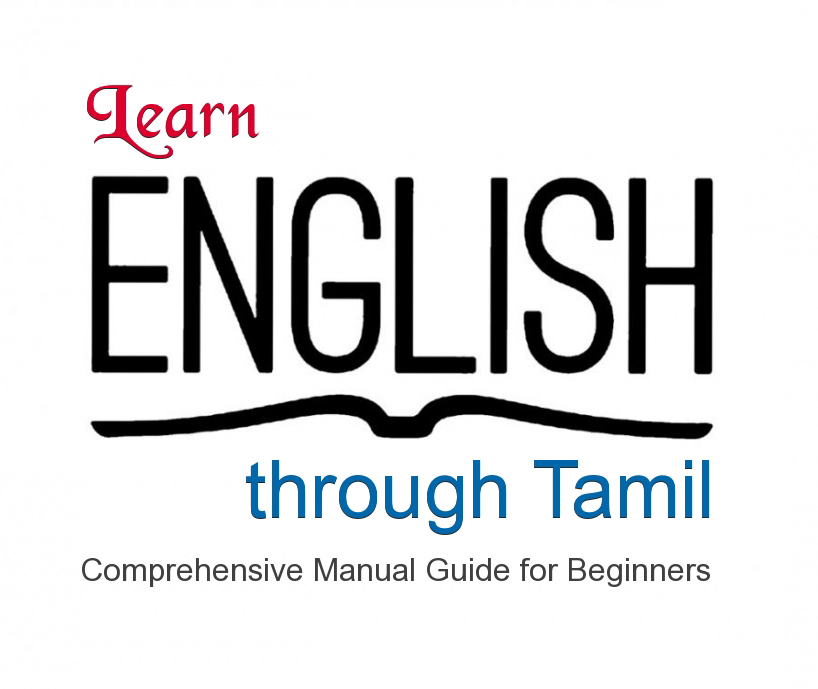

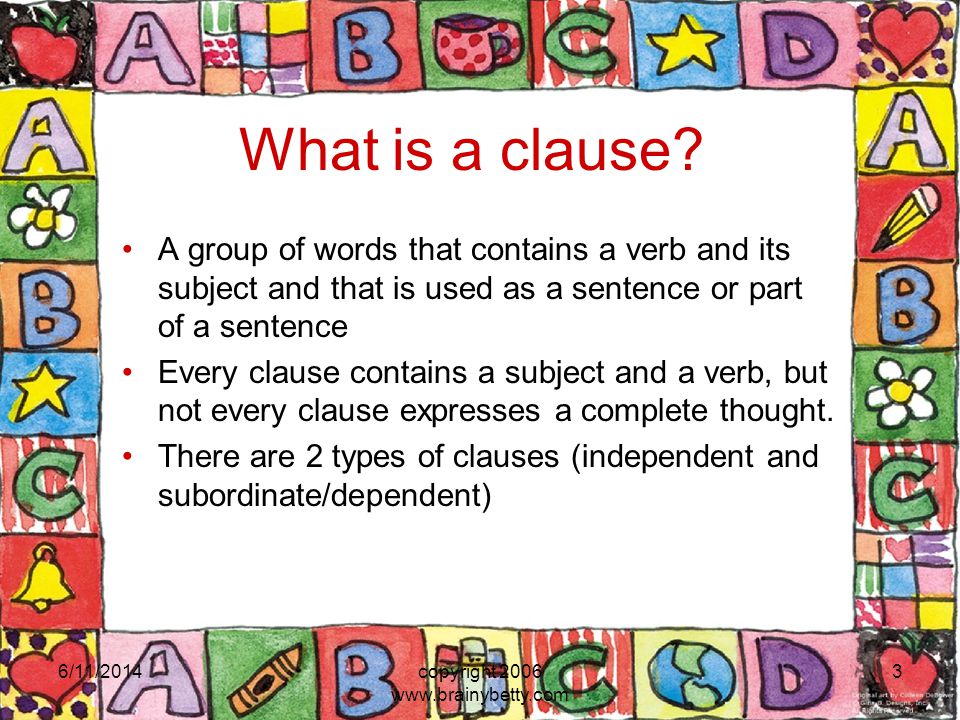
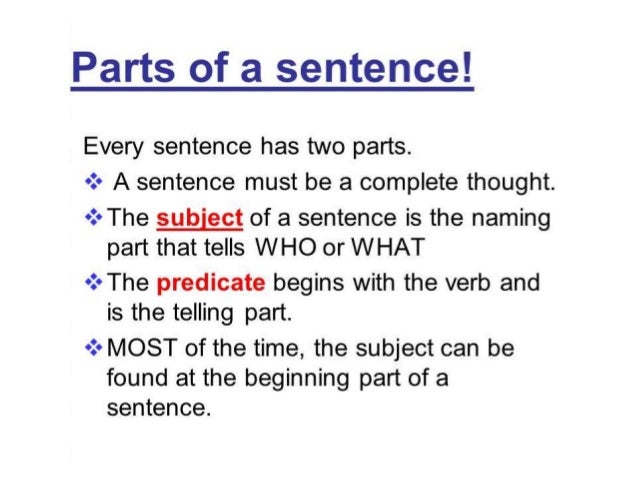 This compound sentence consists of three independent clauses.
We make compound sentences by joining independent clauses with the help of coordinating conjunctions.
More examples of compound sentences are given below.
This compound sentence consists of three independent clauses.
We make compound sentences by joining independent clauses with the help of coordinating conjunctions.
More examples of compound sentences are given below.
 Two independent clauses need to be connected with a coordinating conjunction or separated with a full stop or a semicolon.
Two independent clauses need to be connected with a coordinating conjunction or separated with a full stop or a semicolon.
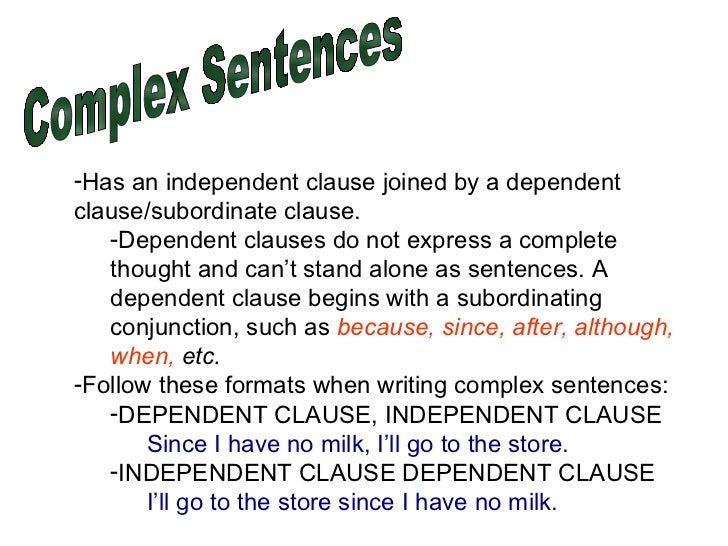
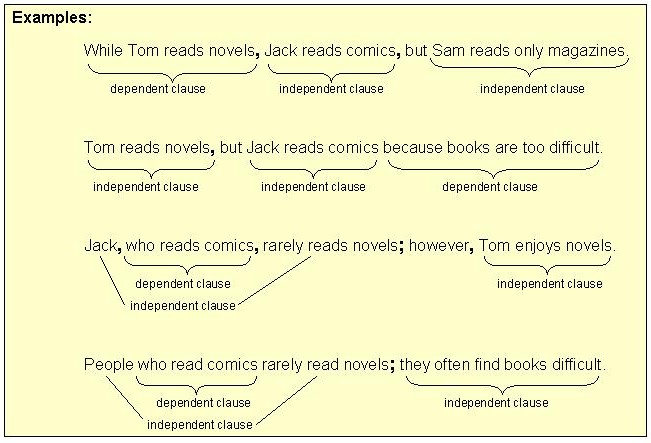 ]]>
]]>






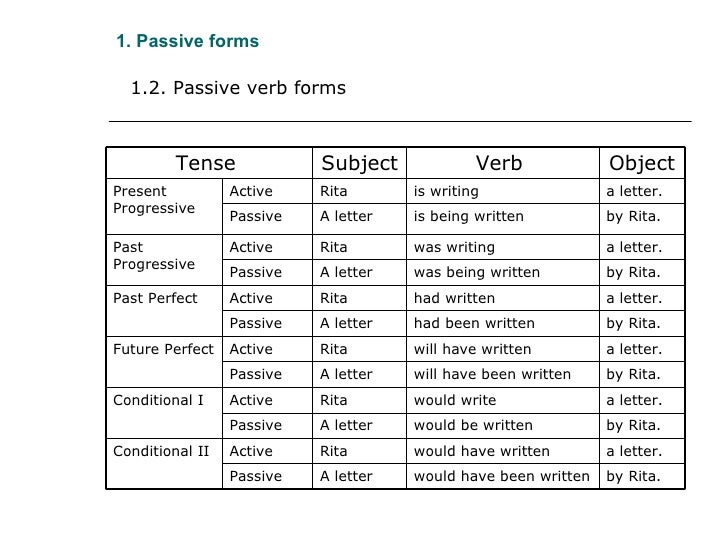
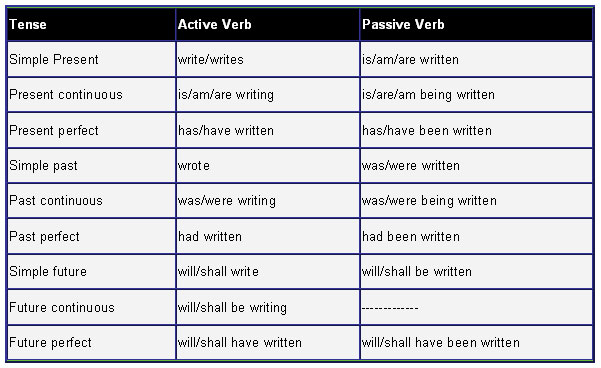


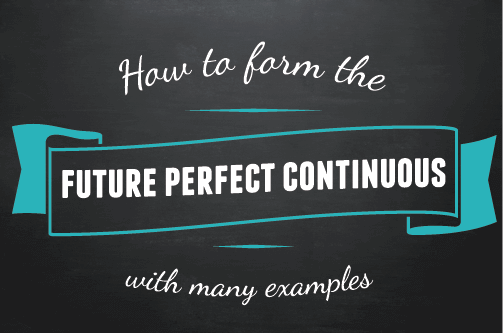

 USE 1 Duration Before Something in the Future
USE 1 Duration Before Something in the Future

 The Future Perfect expresses the idea that something will occur before another action in the future. It can also show that something will happen before a specific time in the future.
The Future Perfect expresses the idea that something will occur before another action in the future. It can also show that something will happen before a specific time in the future.
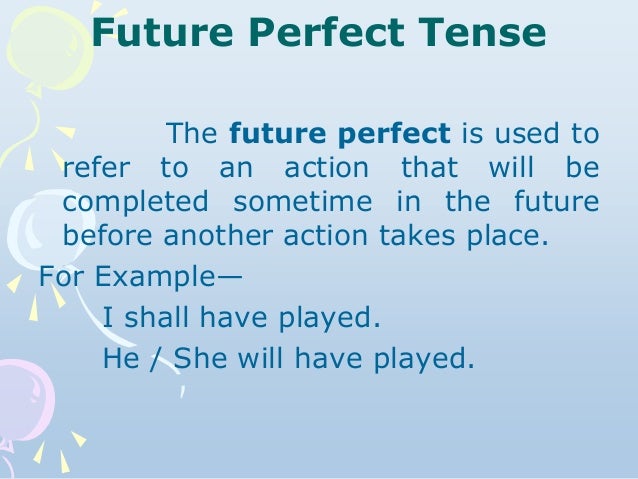




 Use the Future Continuous to indicate that a longer action in the future will be interrupted by a shorter action in the future. Remember this can be a real interruption or just an interruption in time.
Use the Future Continuous to indicate that a longer action in the future will be interrupted by a shorter action in the future. Remember this can be a real interruption or just an interruption in time.
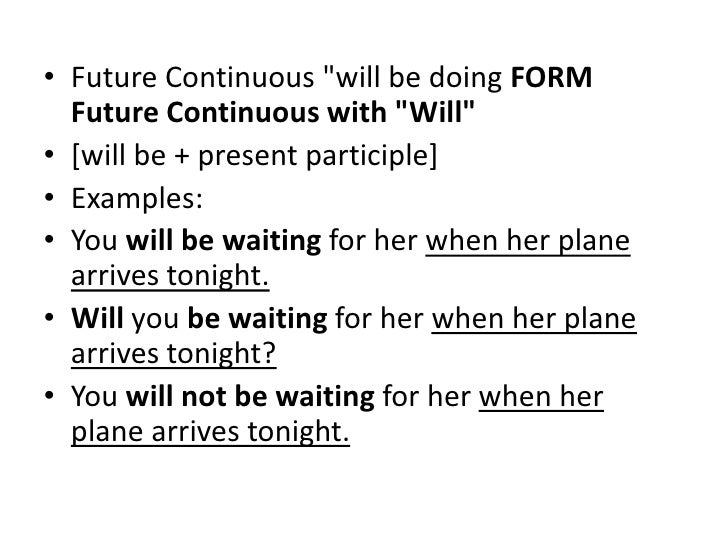
 When you use the Future Continuous with two actions in the same sentence, it expresses the idea that both actions will be happening at the same time. The actions are parallel.
When you use the Future Continuous with two actions in the same sentence, it expresses the idea that both actions will be happening at the same time. The actions are parallel.


